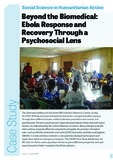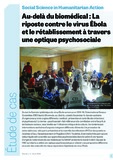Beyond the Biomedical: Ebola Response and Recovery Through a Psychosocial Lens
Au-delà du biomédical : La riposte contre le virus Ébola et le rétablissement à travers une optique psychosociale
| dc.contributor.author | Jones, Theresa | |
| dc.coverage.spatial | Liberia | en |
| dc.date.accessioned | 2020-06-16T08:55:38Z | |
| dc.date.available | 2020-06-16T08:55:38Z | |
| dc.date.issued | 2020-06-16 | |
| dc.identifier.citation | Jones, T. (2020) Beyond the Biomedical: Ebola Response and Recovery Through a Psychosocial Lens, SSHAP Case Study 3, UNICEF, IDS and Anthrologica. | en |
| dc.identifier.citation | Jones, T. (2020) Au-delà du biomédical : La riposte contre le virus Ébola et le rétablissement à travers une optique psychosociale, Étude de cas SSHAP Numéro 3, UNICEF, IDS et Anthrologica | fr |
| dc.identifier.uri | https://opendocs.ids.ac.uk/opendocs/handle/20.500.12413/15414 | |
| dc.description.abstract | The International Rescue Committee (IRC) based in Monrovia, Liberia, during the 2014–16 Ebola outbreak attempted to look at the emergency health response through three different lenses: medical; infection prevention and control; and psychosocial. The term ‘psychosocial’ means the interrelation of the mind with social factors, all underpinned by the critical influence of culture. Many emergency health interventions integrate different components alongside the provision of medical care, such as infection prevention and control (IPC) and water, sanitation and hygiene (WASH). It is less common, however, to see psychosocial approaches given such equal value within an emergency response. This SSHAP Case Study details how the IRC team in Liberia used a psychosocial lens to gain a different perspective and open ways forward to better respond to the Ebola epidemic. | en |
| dc.description.abstract | Durant la flambée épidémique du virus Ébola survenue en 2014–16, l’International Rescue Committee (IRC) basé à Monrovia, au Libéria, a tenté d’examiner la riposte sanitaire d’urgence sous trois angles différents : médical ; prévention et contrôle des infections ; et psychosocial. Le terme « psychosocial » fait référence à la corrélation entre l’esprit et les facteurs sociaux, tous fondés sur l’influence critique de la culture. De nombreuses interventions sanitaires d’urgence intègrent différents éléments à la prestation de soins médicaux, tels que la prévention et le contrôle des infections (PCI) et les questions relatives à l’eau, l’assainissement et l’hygiène (EAH). Toutefois, il est moins fréquent qu’une valeur égale soit accordée aux approches psychosociales dans le cadre d’une riposte d’urgence. Cette étude de cas réalisée par la SSHAP présente la manière dont l’équipe de l’IRC au Liberia a utilisé une optique psychosociale pour obtenir une perspective différente et ouvrir des voies afin de mieux répondre à l’épidémie de virus Ébola. | fr |
| dc.description.sponsorship | UNICEF | en |
| dc.description.sponsorship | USAID | en |
| dc.language.iso | en | en |
| dc.publisher | SSHAP | en |
| dc.relation.ispartofseries | SSHAP Case Studies;Issue 3 | |
| dc.rights.uri | http://creativecommons.org/licenses/by/4.0/ | en |
| dc.title | Beyond the Biomedical: Ebola Response and Recovery Through a Psychosocial Lens | en |
| dc.title | Au-delà du biomédical : La riposte contre le virus Ébola et le rétablissement à travers une optique psychosociale | fr |
| dc.type | Series paper (non-IDS) | en |
| dc.rights.holder | SSHAP | en |
| dc.identifier.externaluri | https://www.socialscienceinaction.org/ | |
| rioxxterms.funder | Default funder | en |
| rioxxterms.identifier.project | Default project | en |
| rioxxterms.version | NA | en |
| rioxxterms.funder.project | 9ce4e4dc-26e9-4d78-96e9-15e4dcac0642 | en |



